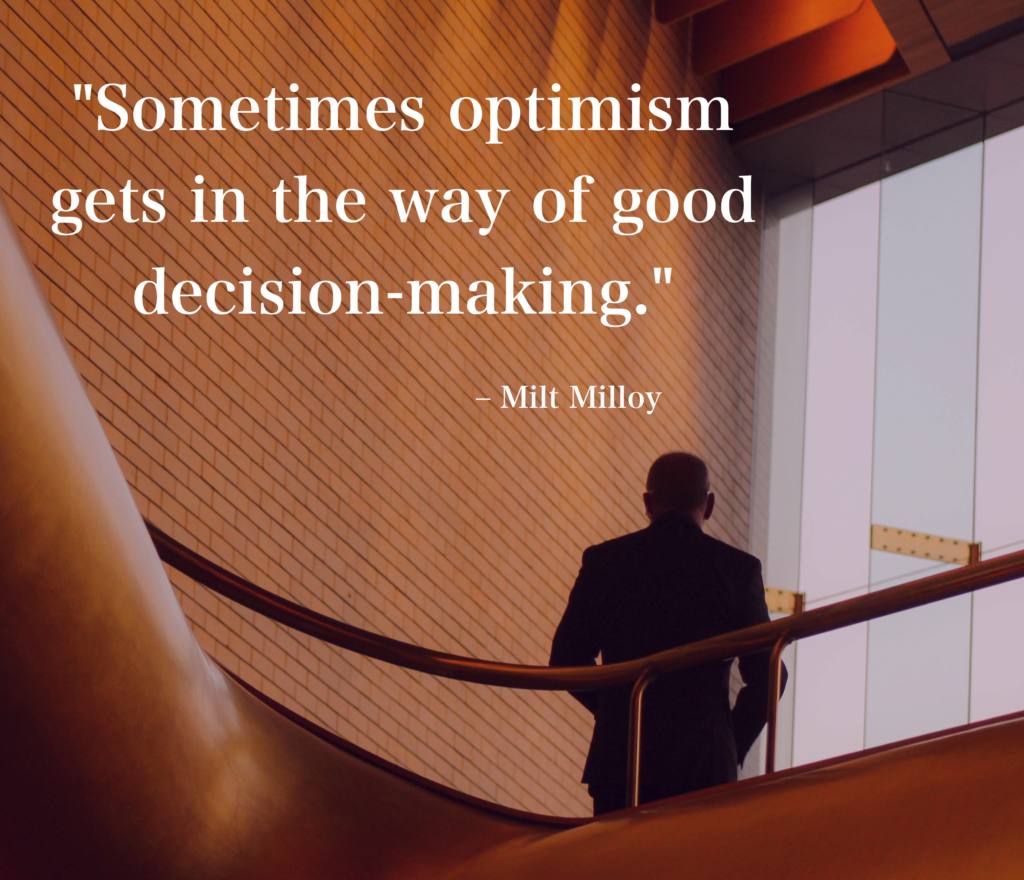Milt Milloy is the entrepreneur behind Springboard Startup and Springboard Turnaround. He helps businesses set themselves up, and helps them figure out how to save themselves when money runs dangerously low. I came across Milloy’s work via his Medium posts about handling a cash crisis. (This is not a problem for me, but it’s an interesting quandary in general.) I was impressed by his ruthlessness:
“If you, the owner or manager, have difficulty telling people no, put someone in charge of expenditures that does not. Different personality types will struggle with being the cash gatekeeper more than others. Find someone who cares less about being liked and more on doing the right thing to achieve the desired outcome — in this case conserv[ing] cash and buy[ing] time.”
I spoke to Milloy on the phone about what companies can do to avoid needing Springboard Turnaround’s services. As he told me, “When things haven’t gone well, you’re kinda on rough seas at that point. Being able to build a realistic plan and articulate it to all of those stakeholders to keep them from jumping ship” can stop the hemorrhage of confidence. If that confidence drains away, so do your customers, employees, and investors, which is the worst-case scenario. (I hope you’ll never reach that point, dear reader! And I hope that I won’t either.)
Founders can be their own worst enemies. Milloy stated, “As things continue to spiral down, it really is very similar to a grieving process. At first there’s denial, then anger and blame.” Eventually the company must come to grips with harsh reality.

Milloy explained, “When somebody launches a company that is what I would call fatally flawed, they haven’t done adequate customer-discovery work.” In other words, “They’re building a product or creating a service that they really don’t have a good customer base for.” Additionally, “Markets change, competitive dynamics change — some of those are very difficult to predict and they just happen.” A successful company will have a certain amount of flexibility.
I asked Milloy what he thinks of unit-economics disasters like SpoonRocket and some of its on-demand brethren. He told me that these implosions are “what happens if [the cost to deliver the product] just hasn’t been tested enough and recorded enough.” In those scenarios, “The forecast is just way too optimistic.” Milloy endorsed the rule of thumb that “it’s gonna take twice as much money and twice as long” as your first guess to accomplish your business objectives.
“Two challenges. One is to actually produce the product or service. Founders are underestimating how much that’s really gonna cost.” The second challenge is that the “cost of getting the customer — the marketing cost — is very underestimated.” Milloy knows this from gritty hands-on experience. “I had an agricultural-based business that I started from scratch,” which ran into cashflow issues. He admitted, though not ruefully, “I got some education in the school of hard knocks.”
Fundamentally, Milloy said, there are “three big categories of problems [that a company can face] and a whole bunch of different sub-categories within them.” You have to sell something, AKA convince people to buy from you. You have to spend less money than you’re taking in. And thirdly, “You can’t carry such a debt load that even if you are making money, you can’t service the debt.” It really boils down to living within your means, not unlike personal finance.
Rest assured, Milloy is in favor of bootstrapping when you can make it work:
“Bootstrapping is not for everyone. It requires more personal sacrifice. And the slower trajectory may allow competitors to leap ahead. However, if you are convinced your idea has potential but investors are not interested, it can be a satisfying path forward. The upside is, if successful, you will have 100% ownership in a debt-free business.”